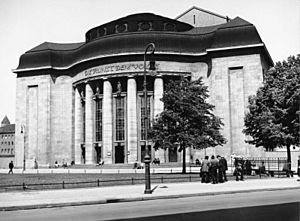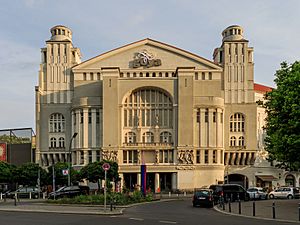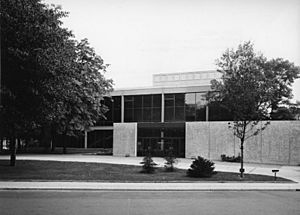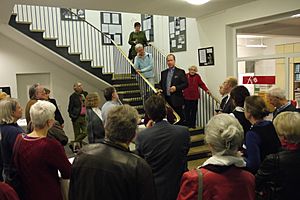Erwin Piscator facts for kids
Quick facts for kids
Erwin Piscator
|
|
|---|---|
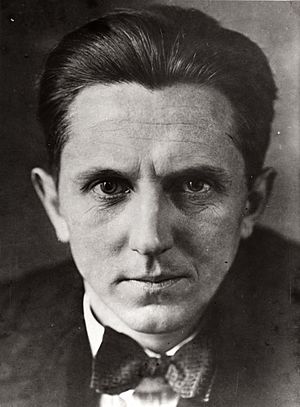
Portrait of Piscator, c. 1927
|
|
| Born |
Erwin Friedrich Max Piscator
17 December 1893 Greifenstein-Ulm, German Empire
|
| Died | 30 March 1966 (aged 72) Starnberg, West Germany
|
| Education |
|
| Occupation | Theatre director, producer |
| Known for | Founded the Dramatic Workshop at The New School for Social Research (1940). |
|
Notable work
|
The Political Theatre (1929) |
| Style | Epic Theatre, Documentary theatre |
| Spouse(s) | Hildegard Jurczyk (m. 1919) Maria Ley (m. 1937) |
| Relatives | Johannes Piscator |
| Signature | |
 |
|
Erwin Friedrich Maximilian Piscator (born December 17, 1893 – died March 30, 1966) was a famous German theatre director and producer. He was known for developing "epic theatre" alongside Bertolt Brecht. This type of theatre focused on showing the social and political ideas in a play. It was less about making the audience feel strong emotions or just enjoying the beauty of the show.
Contents
Biography of Erwin Piscator
Early Life and War Experience
Erwin Friedrich Max Piscator was born on December 17, 1893. He grew up in a small village in Prussia, which was part of Germany. His father, Carl Piscator, was a merchant. Erwin's family had a history of important people, like Johannes Piscator, who translated the Bible.
In 1899, his family moved to Marburg. There, Erwin went to the Gymnasium Philippinum school. Later, in 1913, he studied German, philosophy, and art history at the University of Munich. He also took a well-known class on theatre history.
Piscator started acting in 1914 at the Munich Court Theatre. He had small roles that were not paid.
World War I and Its Impact
During World War I, Piscator was called to join the German army. He served as a soldier on the front lines starting in 1915. This experience made him hate militarism and war for the rest of his life.
He wrote some sad poems that were published in a magazine. In 1917, after being in battles and the hospital, he joined a new army theatre group. When the war ended in 1918, Piscator took part in the November Revolution. He even gave a speech at a meeting for soldiers.
Success in the Weimar Republic
After the war, Piscator went back to Berlin. He joined the Communist Party of Germany (KPD). He helped create a theatre group called the Proletarian Theatre. This group was for revolutionary workers.
Piscator then started his own theatre company in Berlin. He followed the idea of a "people's stage" (Volksbühne). From 1924 to 1927, he directed plays at the Volksbühne. Later, he ran his own theatre, the Piscator-Bühne.
He produced plays that were very social and political. His goal was to influence people's votes or explain left-wing ideas. He used new techniques like moving sets, lectures, and movies in his shows.
Controversial Plays and New Ideas
In 1926, Piscator caused a lot of discussion with his play The Robbers. He changed the original play to fit his political beliefs. He made the main character, Karl Moor, seem self-centered. Another character, Spiegelberg, became a voice for the working-class revolution. When Spiegelberg died, the audience heard the song The Internationale.
In 1927, Piscator started his own important theatre, the Piscator-Bühne. In 1928, he created a famous version of the novel The Good Soldier Schweik. Bertolt Brecht helped him with this play. Brecht later called it a "montage from the novel."
In 1929, Piscator published his book The Political Theatre. This book explained his ideas about theatre. He wrote that the book was meant to explain "epic, i.e. political theatre." He wanted to make it clear that these theatre methods were tied to specific messages.
Working Abroad and Returning to Germany
In 1931, Piscator went to Moscow in the Soviet Union. He worked on a movie there. Because Adolf Hitler came to power in Germany in 1933, Piscator could not return home. He stayed in the Soviet Union as an exile.
In 1936, Piscator moved to France. In 1937, he married Maria Ley, a dancer, in Paris. Bertolt Brecht was one of the people who stood with them at their wedding.
Moving to the United States
Piscator and his wife moved to the United States in 1939. He was asked to start a theatre workshop at The New School in New York. Many famous actors studied with Piscator there. These included Marlon Brando, Tony Curtis, Harry Belafonte, and Walter Matthau.
After World War II, Piscator returned to West Germany in 1951. He faced political pressure in the United States because of his past connections to communism. In 1962, Piscator became the manager and director of the Freie Volksbühne in West Berlin.
In 1963, he directed a play called The Deputy. This play was about Pope Pius XII and the rescue of Jewish people during the Nazi era. Piscator continued to be a major figure in modern and documentary theatre until he died in 1966. His wife, Maria Ley, passed away in New York City in 1999.
Piscator's Influence on Theatre
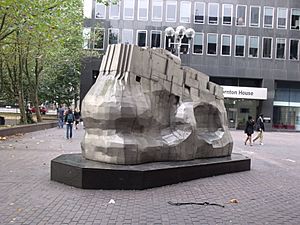
| Instead of private stories, we had general ideas. Instead of special things, we had typical ones. Instead of accidents, we had causes. Fancy decorations were replaced by built structures. Reason was as important as emotion. Feelings were replaced by teaching, and imagination by real facts. |
| Erwin Piscator, 1929. |
Many theatre experts say that Piscator's work was a very bold step forward for German theatre in the 20th century. His theatre methods from the 1920s had a big impact on how plays were produced in Europe and America. He used things like still images and movie clips in his shows. He also used complex stages with scaffolding.
Piscator's way of creating contrasts in his plays led to strong political and satirical effects. This also helped develop the commentary style of epic theatre.
In West Germany, Piscator's style of theatre became popular again after 1962. He directed several plays that explored Germany's Nazi past and other current issues. He inspired a type of theatre that focused on memory and real-life documents. His stage version of Leo Tolstoy's novel War and Peace has been performed in about 16 countries since 1955.
Legacy and Honors
In 1980, a large sculpture by Scottish artist Eduardo Paolozzi was put up in London to honor Piscator. In 1985, an annual Erwin Piscator Award was started in New York City. This was the adopted home of Piscator's wife, Maria Ley.
Since 1996, a Piscator Prize of Honors has also been given each year. This award honors people who support art and culture. The organization that hosts these awards works to encourage artistic and academic exchange between the United States and Europe. In 2016, a monument to Piscator was built in his hometown of Greifenstein-Ulm.
Piscator's artistic papers are kept in archives in Berlin and at Southern Illinois University Carbondale.
Films
- Revolt of the Fishermen (Восстание рыбаков). Directed by Erwin Piscator, USSR 1932–1934.
Works
- Piscator, Erwin. 1929. The Political Theatre. A History 1914–1929. This book discusses the theory of theatre.
- Tolstoy, Leo. War and Peace. Adapted for the Stage by Alfred Neumann, Erwin Piscator, and Guntram Prüfer.
Images for kids
See also
 In Spanish: Erwin Piscator para niños
In Spanish: Erwin Piscator para niños
 | James Van Der Zee |
 | Alma Thomas |
 | Ellis Wilson |
 | Margaret Taylor-Burroughs |


